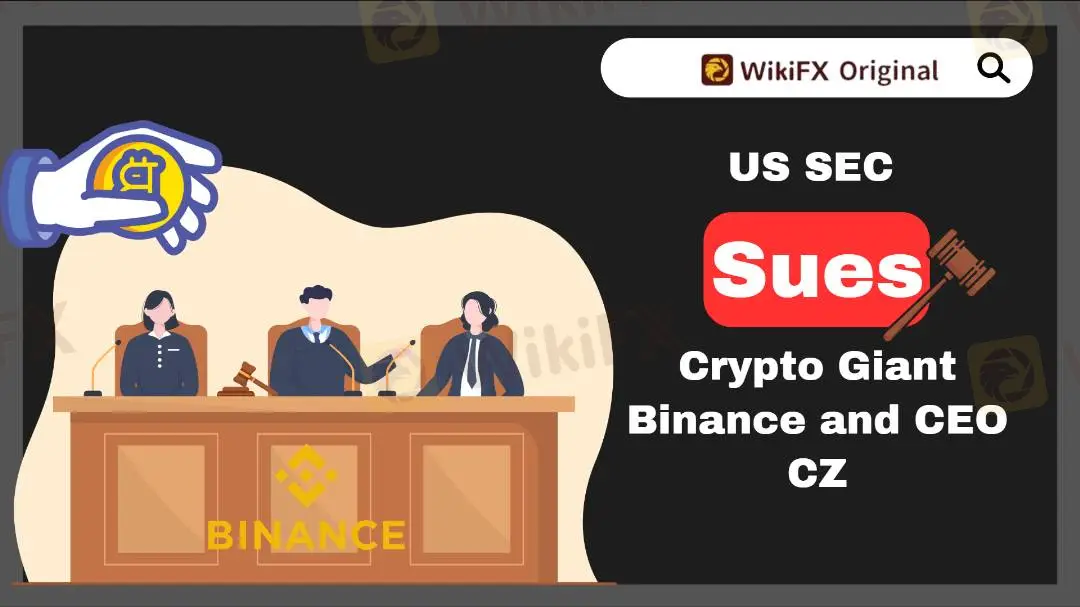简体中文
繁體中文
English
Pусский
日本語
ภาษาไทย
Tiếng Việt
Bahasa Indonesia
Español
हिन्दी
Filippiiniläinen
Français
Deutsch
Português
Türkçe
한국어
العربية
US SEC Sues Crypto Giant Binance and CEO CZ
Abstract:The U.S. Securities and Exchange Commission has filed a lawsuit against Binance entities, including its CEO Changpeng "CZ" Zhao.

Binance Exchange and its CEO, Changpeng “CZ” Zhao, are facing a lawsuit filed by the United States Securities and Exchange Commission (SEC) for alleged violations of U.S. securities laws. The SEC has included both the international and U.S. operations of the trading platform in the lawsuit, as reported by Bloomberg.
The SEC has brought forth 13 charges against Binance, accusing them of illegal operations in the U.S. and deceiving customers. Furthermore, the regulatory authority has classified cryptocurrencies like Cardano (ADA), Polygon (MATIC), and Solana (SOL), among others traded on Binance, as securities.
The highly anticipated lawsuit has caused significant disruption within the crypto ecosystem, particularly impacting the price of Binance Coin (BNB). As a key cryptocurrency associated with the operations of Binance Exchange, BNB has experienced a notable decline, currently trading at $289, representing a 5.47% decrease in value over the past 24 hours. This development has sparked widespread concern and discussion among market participants.
CZ Responds, Calms Community
Despite limited information provided by the Binance CEO, he took to Twitter to assure his extensive follower base of over 8.4 million users that dedicated teams are actively working to maintain normal functionality for deposits and withdrawals. While reports suggest that the CEO might be stepping down from his position, he acknowledged not having seen the complaints and indicated that a response will be forthcoming once he and his team have received the official complaint from the market regulator. The situation continues to unfold, prompting anticipation for further updates and clarifications from Binance.

Binance Crackdown by the SEC: an Unusual Event
The recent action taken by the US SEC against Binance Exchange doesn't come as a surprise to industry insiders who have been closely monitoring developments in the cryptocurrency ecosystem this year. The SEC has been actively pursuing legal action against several crypto firms, including Kraken exchange, which faced allegations of offering unregistered securities through its staking product. Kraken promptly settled with the regulator by paying a $30 million fine.
In addition to direct crackdowns, the SEC has also issued Wells Notices to other entities like Coinbase Global Inc, indicating potential lawsuits in the future.
While Binance is currently in the spotlight, it remains uncertain whether the exchange will opt for settlement or pursue a legal battle with the commission. The situation calls for continued monitoring to see how it unfolds and how Binance chooses to respond.

Disclaimer:
The views in this article only represent the author's personal views, and do not constitute investment advice on this platform. This platform does not guarantee the accuracy, completeness and timeliness of the information in the article, and will not be liable for any loss caused by the use of or reliance on the information in the article.
Read more

Binance’s Bold Move: 12 Trading Pairs Are Getting Delisted
Binance, one of the world’s largest cryptocurrency exchanges, will remove 12 spot trading pairs from its platform on January 17, 2025, at 03:00 (UTC).

BitMEX Fined $100M in U.S. for Anti-Money-Laundering Violations
BitMEX fined $100M for anti-money laundering and KYC violations. The case highlights the U.S. crackdown on crypto platforms ignoring Bank Secrecy Act rules.

South Korea's Crypto Regulation Updates for 2025
South Korea's 2025 crypto regulations by the FSC focus on investor protection, stablecoin rules, and market transparency, addressing crypto tax delays and ecosystem reforms.

12 Chinese, 5 Filipinos Arrested in Paranaque Scam Operation
NBI arrests 12 Chinese nationals, and 5 Filipinos in Paranaque for scamming, bribery, cryptocurrency fraud, and violations of the Cybercrime Prevention Act.
WikiFX Broker
Latest News
How Long Can the Dollar Remain Strong?
Forex Price Trend Prediction! | Come be a New Year Price Winner!
HFM NY Special Offer!
How a Promised RM1.4 Million Return Turned into a Costly Scam
First Unfair Trading Case Reported Under South Korea’s Virtual Asset User Protection Act
Cinkciarz.pl Under Fire: Frozen Accounts, Missing Funds
“Predict and Win” Big Rewards! Join the Contest Now
South Korean President Yoon Suk Yeol's Arrest Shakes Markets
Titanium Capital LLC Ponzi Scheme: Henry Abdo Admits Fraud, Impacting Over 200 Investors
South Korea's Crypto Regulation Updates for 2025
Currency Calculator






